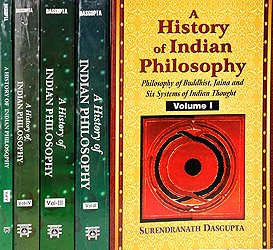A History of Indian Philosophy Volume 4
Indian Pluralism
by Surendranath Dasgupta | 1949 | 186,278 words | ISBN-13: 9788120804081
This page describes the philosophy of emotionalism of caitanya: a concept having historical value dating from ancient India. This is the third part in the series called the “caitanya and his followers”, originally composed by Surendranath Dasgupta in the early 20th century.
Part 3 - Emotionalism of Caitanya
The religious life of Caitanya unfolds unique pathological symptoms of devotion which are perhaps unparalleled in the history of any other saints that we know of. The nearest approach will probably be in the life of St Francis of Assisi; but the emotional flow in Caitanya seems to be more self-centred and deeper. In the beginning of his career he not only remained immersed as it were in a peculiar type of self-intoxicating song-dance called the kīrtana, but he often imitated the various episodes of Kṛṣṇa’s life as told in the Purāṇas. But with the maturity of his life of renunciation his intoxication and his love for Kṛṣṇa gradually so increased that he developed symptoms almost of madness and epilepsy. Blood came out of the pores of his hair, his teeth chattered, his body shrank in a moment and at the next appeared to swell up. He used to rub his mouth against the floor and weep, and had no sleep at night. Once he jumped into the sea; sometimes the joints of his bones apparently became dislocated, and sometimes the body seemed to contract. The only burden of his songs was that his heart was aching and breaking for Kṛṣṇa, the Lord. He was fond of reading the dramas of Rāmānanda Ray, the poems of Caṇḍidāsa and Vidyāpati, the Kṛṣṇa-karṇāmṛta of Vilva-maṅgala and the Gīta-govinda of Jayadeva; most of these were mystic songs of love for Kṛṣṇa in erotic phraseology. Nowhere do we find any account of such an ecstatic bhakti in the Purāṇas, in the Gītā or in any other religious literature of India—the Bhāgavata-purāṇa has, no doubt, one or two verses which in a way anticipate the sort of bhakti that we find in the life of Caitanya—but without the life of Caitanya our storehouse of pathological religious experience would have been wanting in one of the most fruitful harvests of pure emotionalism in religion. Caitanya wrote practically nothing, his instructions were few and we have no authentic record of the sort of discussions that he is said to have held. He gave but little instruction, his preaching practically consisted in the demonstration of his own mystic faith and love for Kṛṣṇa; yet the influence that he exerted on his contemporaries and also during some centuries after his death was enormous. Sanskrit and Bengali literature during this time received a new impetus, and Bengal became in a sense saturated with devotional lyrics. It is difficult for us to give any account of his own philosophy save what we can gather from the accounts given of him by his biographers. Jīva Gosvāmī and Baladeva Vidyābhūṣaṇa are probably the only persons of importance among the members of his faith who tried to deal with some kind of philosophy, as we shall see later on.
